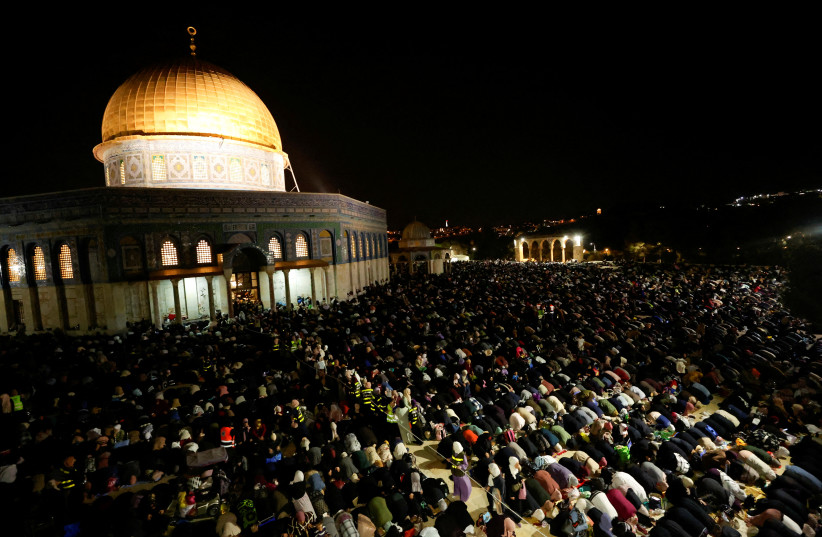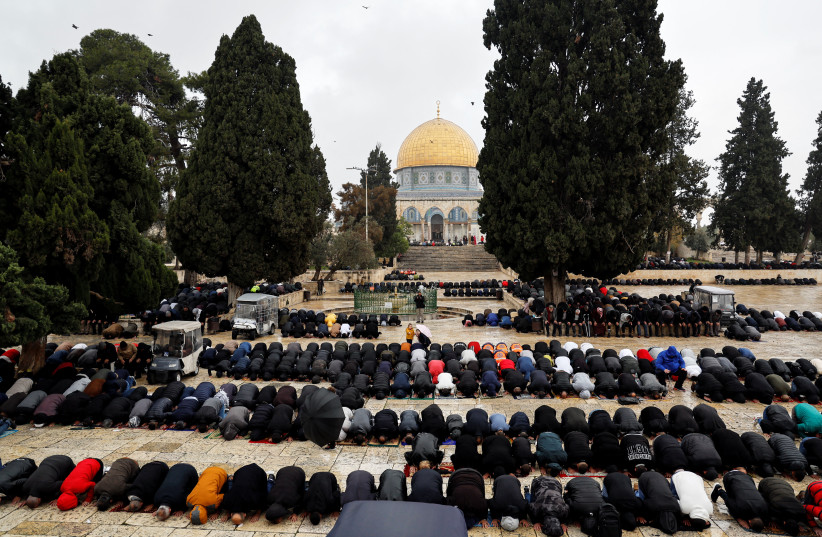The co-occurrence of Ramadan and Nisan provides a unique opportunity - opinion

Perhaps in these trying times, we can put aside our differences and work together for a better future for all.
Aside from being loyal sons of our beloved alma mater, one might think we had nothing in common.
Ramsey is a first-year student at Dartmouth College in Hanover, New Hampshire; Yisrael is heading to the college this summer to attend his 40th reunion. One is an Orthodox Jew; the other, a devout Arab Muslim.
We come from religious and cultural backgrounds which are often seen as being quite different. Yet we wish to make it known that we have much more in common than just our disdain for the Princeton football team.
For the first time in decades, the lunar holy months of Nisan and Ramadan begin at the exact same time: shortly after sunset on Wednesday. Now is an ideal opportunity for us to talk about Judaism, Islam, friendship and the world.
The Jewish and Islamic calendars

Both Islam and Judaism follow calendars that differ from the default calendar used by most of the world today. Nisan, the Hebrew month and Ramadan, the Muslim month, are times for introspection, self-improvement and renewal when Jews and Muslims embark on prayer, remembrance and good deeds.
During Ramadan, Muslims fast from sunrise to sunset daily, give alms to the poor and recite the entire Quran. Ramadan is the month of forgiveness and making a clean slate, a time to cleanse oneself of the past year by keeping the fast and studying the Quran. For Jews, Nisan is a month for giving thanks for the trees that are bearing new fruit, celebrating Passover, the holiday of freedom, and reading publicly those sections of the Torah that commemorate the liberation from servitude in Egypt.
Nisan is the month of spring and the first month of the agricultural year, a time to rejoice and prepare for the new year ahead. Like Nisan, Ramadan is a time for reflection and a constant reminder of the Quran through fasting from sun up to sun down.
Jews, too, share a tradition of fasting in the month of Nisan. The Fast of the Firstborn is the day before Passover. It is an ancient and celebrated Jewish tradition that commemorates the miracles that took place in Egypt.
Nisan is also a time to think about restoration and freedom. The Exodus from Egypt took place in Nisan and with it, Jewish liberation from the oppression of Pharaoh, King of Egypt – a story which is directly recounted in the Quran, as well as the Hebrew Bible.
Indeed, Muslims share with Jews an undying belief in the prophets of ancient Israel and their messages and recite their stories in Arabic throughout the prayers of Ramadan. Stories of the Hijrah, the Prophet’s exodus from Mecca to Medina, will be retold right alongside the accounts of Moses, David, Solomon and Job.
More than a coincidence
These parallels between Nisan and Ramadan are more than just a coincidence – they are reflective of the centuries-old bond between our two faiths. Islam and Judaism have actually been partners in the grand progress of human history. Many would be surprised to know that each has given the other great benefit and companionship through our darkest periods and our highest golden ages.
When Prophet Muhammad (peace be upon him) was forced to flee to Medina because of religious persecution, it was the Jewish tribes of the city with whom he sought partnership. With them, he signed the Constitution of Medina, one of the world’s first written constitutions, which gave full equality to all citizens: Jews, Muslims and non-believers.
Centuries after the Romans exiled the Jews from Jerusalem and destroyed their holy places, it was the Muslim caliph who restored the Jews to Jerusalem. The caliph himself, Umar ibn Khattab, worked alongside the Jews to physically clear off the garbage that the Romans had left on the Temple Mount.
In Islamic Spain, Jewish thinkers like Judah Halevi and Abraham Ibn Ezra made essential contributions to Islamic philosophy and science, working within Islamic society to further advance the knowledge of all humankind. Likewise, Muslim thinkers like Averroes left a lasting mark on the work of Jewish scholars, greatly contributing to the Jewish Golden Age in Spain. Together, their efforts have had a lasting impact on the arts and sciences for all humanity.
In Saladin’s time, Jews and Muslims worked side by side to achieve their shared freedom. Saladin’s personal physician was none other than Maimonides, one of the most influential Jewish philosophers and religious scholars in history.
Partners in the quest for the betterment of humankind
As we see it, Islam and Judaism are partners in the quest for the betterment of the human condition. Whether through the development of the arts and sciences or the search for ways to increase and ensure the dignity of all people whom both faiths view as created in the image of the Creator – it is critical and possible to overcome the differences that divide us. In the truest sense of the word, we must be friends – both in religion and in practice.
Even though Jewish-Muslim relations might be tense right now, our present qualms are overshadowed in the grand scheme of history by a much larger story of cooperation. Any political challenges that face right now can be overcome. We envision a day when Muslims and Jews can live side by side peacefully in mutual cooperation for the benefit of all.
The next time Nisan starts the same day as Ramadan, whenever that may be, we are certain that our faiths will be closer than ever before. That day, the moon itself will bear testimony everlasting expression of the commonality of all human beings.
After all, the same moon which shines now will shine then, just the same as it has shone on Jews and Muslims for centuries past. Humanity is made of different souls with different beliefs; yet at the end of the day, we are really united as one family.
Perhaps in these trying times, we can put aside our differences and work together for a better future for all. Inshallah. B’ezrat Hashem.
Ramsey Alsheikh is a first-year student at Dartmouth College, and is part of al-Nur, Dartmouth’s Muslim Student Association. Yisrael Rosenberg lives in Jerusalem with his wife and four children, works at the Western Wall Heritage Foundation in the Old City, and is the author of three books.
Jerusalem Post Store
`; document.getElementById("linkPremium").innerHTML = cont; var divWithLink = document.getElementById("premium-link"); if (divWithLink !== null && divWithLink !== 'undefined') { divWithLink.style.border = "solid 1px #cb0f3e"; divWithLink.style.textAlign = "center"; divWithLink.style.marginBottom = "15px"; divWithLink.style.marginTop = "15px"; divWithLink.style.width = "100%"; divWithLink.style.backgroundColor = "#122952"; divWithLink.style.color = "#ffffff"; divWithLink.style.lineHeight = "1.5"; } } (function (v, i) { });

